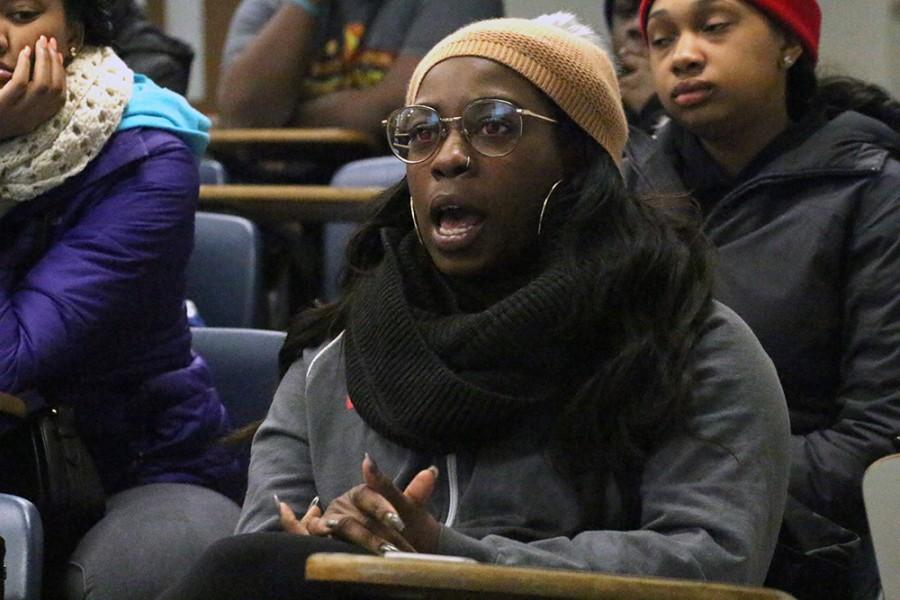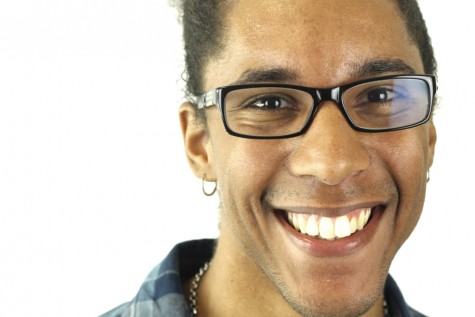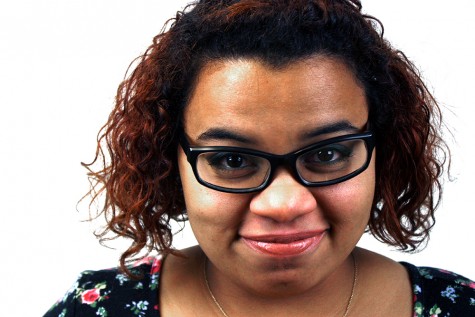Alphas simulate ‘life of a black man’ through testimonials, interactive game
Shamerea Richards, a senior communication studies major, suggests that students learn their basic rights when dealing with law enforcement Monday during “Life of a Black Man” in the auditorium of Coleman Hall.
February 3, 2015
The retail store he worked at had a rule, anyone that looks suspicious and goes into the back of the store must be followed—it’s called “Watch him.”
Chris Johnson, a senior marketing major, said LaCoste, the French clothing store, had an initiative that seemed more like an “unwritten law,” of racial profiling. For example, if three different couples walked into the store: an African-American, Caucasian and Latino, the African-American couple would be approached immediately. They would be asked if they wanted to buy anything. Johnson said this happened because some believed African-Americans go into stores without buying anything, and as a result where scared out of the store.
Johnson’s testimonial was one of many during the Alpha Phi Alpha “Life of a Black Man” event Monday evening, which discussed the average day of an African-American male dealing with racial profiling and stereotypes, as well as cautious attitudes. Students who participated also played an interactive Jeopardy with questions regarding African-American History.
Johnson said the same racial profiling would happen to the Latino couple and the Caucasians, but not to the extent of the others, because of ethnic minorities stereotypes.
“It’s sad. I really didn’t want to go into work sometimes because of how messed up it (was),” Johnson said.
He said he has not worked at the retail store for two years now.
His story is only one of millions that African-American men face in regards to stereotypes. Historically, African-American men have been portrayed as inherently aggressive, uneducated and hypersexual.
Johnson said it’s not right to treat humans differently based on their ethnicities. He said it’s ridiculous how some are watched more carefully than others because of something as small as a color difference.
Many students felt African-Americans were no longer able to rely on police officers because of how they have either been treated in the past, or what has been said via word-of-mouth. Some questioned what to do when the protector becomes the aggressor, and questioned who they can turn to if the police are no longer trustworthy.
Such was the case for Tionna Alderson, a senior communications major. Alderson believes the fear African-Americans may have for the police have now been replaced with distrust.
Reginald Thedford, a senior political science major, said “Black men don’t get the benefit of the doubt anymore.”
Thedford said when he and Philip Love, a junior political science major, who is also a friend, were in Chicago; they were stopped by police officers and questioned what they were hiding. Thedford said another officer pulled up, and he was searched.
“It could easily go from 1-10, you’re dead or arrested,” said Thedford.
Johnson said being an African-American male has its ups and downs. He said an uplifting edge comes from some fellow minorities with accomplishments, and by breaking barriers or stereotypes; but a negative would be that it is sometimes hard to approach others.
“We’re automatically looked at as being negative,” Thedford said.
There is also the burden of representation that many African-Americans feel. This refers to when something negative happens to one African-American no matter the city or state, the entire race as a whole feels responsible for it.
Tavia Fuqua, a senior sociology major, said she sees the struggles African-American men have to go through on a daily basis.
“When they step outside, they play a role associated to them by society,” Fuqua said.
Fuqua said it hurts her feelings when she hears or sees how African-Americans are seen in a bad light. She questioned how other cultures would feel if they saw their people being killed everyday.
African-Americans should come together as a solution, showing society that they are more than single mothers or those being shot down in the street, she said.
The solution needs to have more love for one another, faith in God, education and positivity as a possible solution. Without God people cannot move forward, without education, one cannot distinguish right from wrong, and without love, one cannot form an appreciation for others, Fuqua said.
Roberto Hodge can be reached at 581-2812 rlhodge@eiu.edu.

















![[Thumbnail Edition] Senior Foward Macy McGlone, getsw the ball and gets the point during the first half of the game aginst Western Illinois University,, Eastern Illinois University Lost to Western Illinois University Thursday March 6 20205, 78-75 EIU lost making it the end of their season](https://www.dailyeasternnews.com/wp-content/uploads/2025/03/WBB_OVC_03_O-1-e1743361637111-1200x614.jpg)






















































